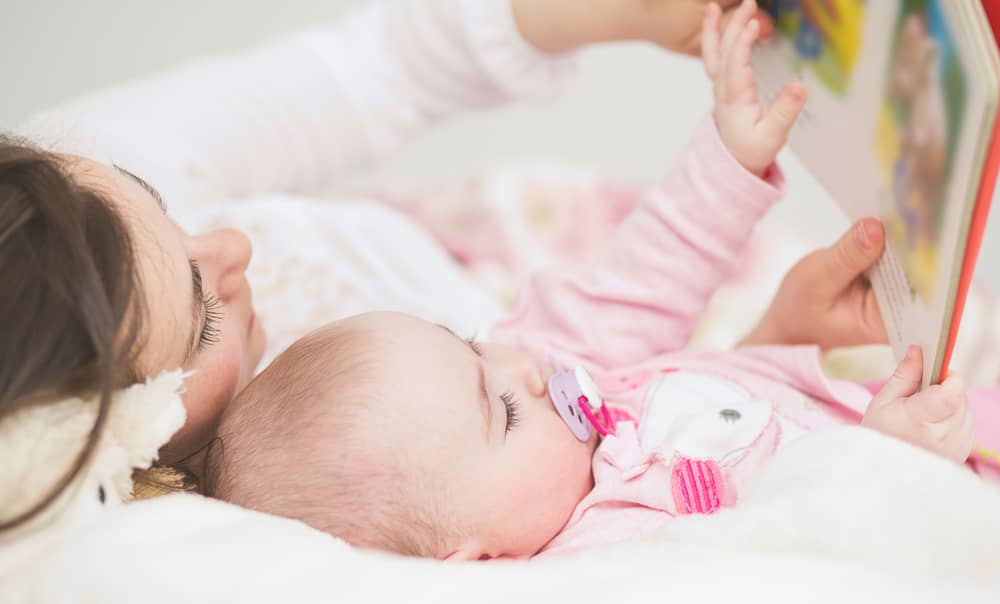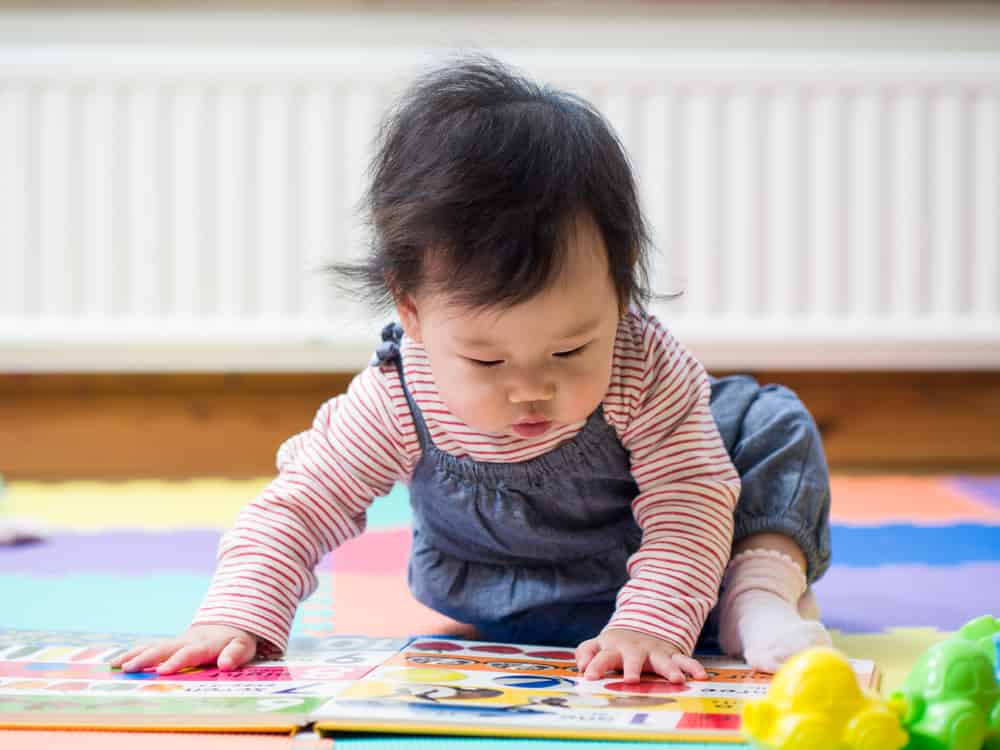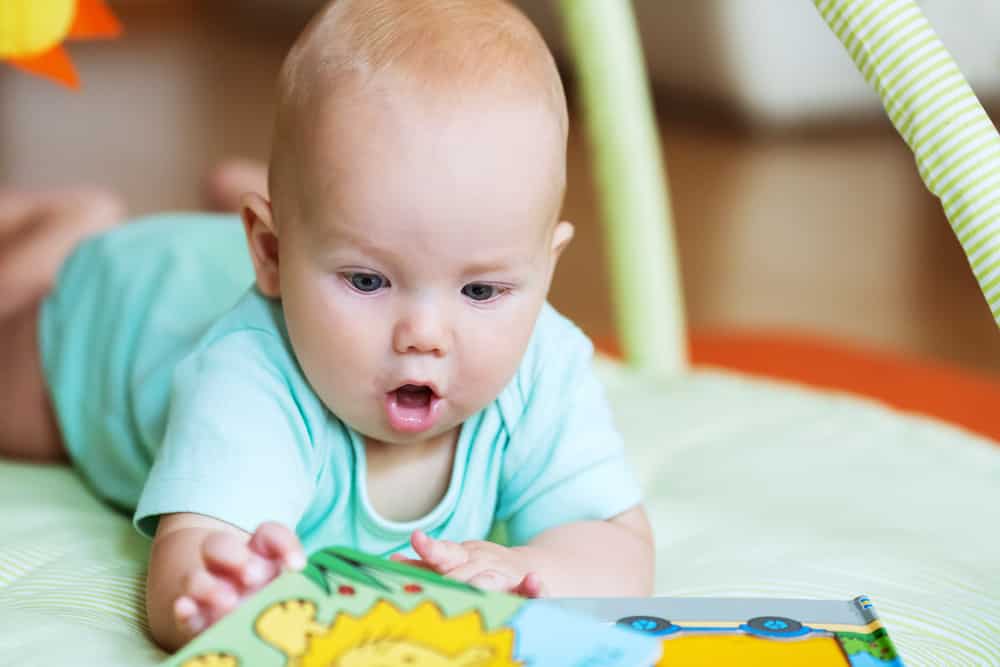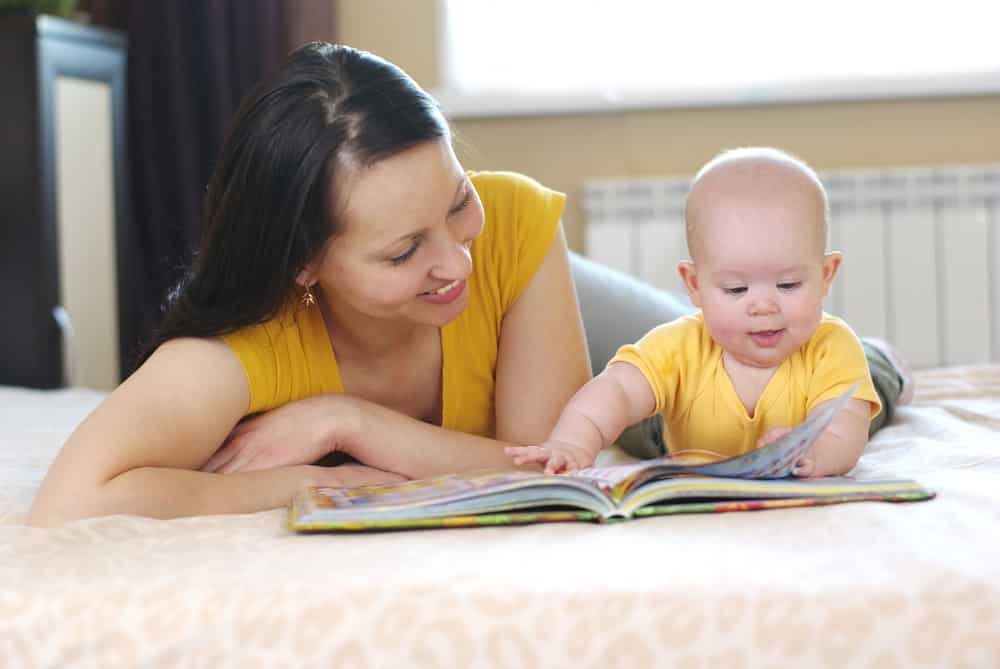Reading is a fantastic activity to perform with your child because it has many advantages for both of you! It's a moment of calm contemplation at the end of a long day and an opportunity to share stories you may have enjoyed as a child. So, when should you start reading to your baby? Any time from 4 months is ideal, but you can read to them anytime! The books that children are read as babies stay with them as they develop. Characters and environments stick with them and might become treasured childhood memories.
As we shall see in this article, reading to babies has many benefits. As your baby grows, reading helps them become more creative, open-minded, and independent. It can also be a source of comfort and security in their lives.
Key Points
- Reading to your baby can help them learn language faster!
- It's important to be consistent with reading time, choose a variety of books, and use positive reinforcement to encourage your child to enjoy reading.
- As your child grows, allow them to choose what books they'd like to read with you. It's a great way to encourage them to discover their own interests!

©Tania Kolinko/Shutterstock.com
When Should You Start Reading To Your Baby?
The best time to start reading to your baby would be around 4 months, as this is when your baby's brain can perceive items such as language. You can do this even earlier, your baby will not mind!
Not only does it help with language development, but it also stimulates the brain, encourages bonding, and teaches vocabulary. As your baby grows, reading helps them become more creative, open-minded, and independent. It can also be a source of comfort and security in their lives.
Crucial Tips To Apply When Reading To Your Baby
Reading to your baby may be difficult when you have no idea where to start. Here are some tips to help you make the most of this special time together.
1. Talk to your baby while you read: Talking and interacting with your baby during the reading session encourages them to connect with the book and helps them develop language skills.
2. Make it interactive: Use different voices for characters, and allow your baby to touch or feel objects in books that are safe for them. This way, your baby gets to learn the texture and patterns of different items.
3. Vary the materials: Experiment with different types of books such as board books, pop-ups, and touch-and-feel books for variety in reading experiences. Try singing lullabies or nursery rhymes together, too!
4. Read often: The more you read to your baby, the faster they learn and remember words. Develop a regular reading routine with your baby, and make it fun!
5. Provide positive reinforcement: Show enthusiasm and joy when reading to your baby. This encourages them to listen with interest. Praise their efforts when they interact or show excitement. This helps them to become more excited about reading in the future.
6. Take breaks: If you find your baby getting fussy or distracted, take a break from the book. Reading should be an enjoyable experience for both of you! Try again when they are more settled and attentive.
7. Be patient: Teaching your baby how to read takes time. Be patient and allow them to explore books at their own pace. Reading provides an excellent opportunity for bonding with your baby, so make the most of it!
8. Have fun: Enjoy this particular time with your baby! Make funny faces, smile and laugh together – reading is an enjoyable experience that brings you closer to your baby.
9. Set an example: Show your baby that reading is essential by reading yourself! Your baby will also follow your lead and develop a love of reading. Reading to them every day helps cement good habits for the future.
10. Create positive associations with books: Allow your baby to explore books safely and positively. Let them turn the pages themselves, feel different textures, or talk about the pictures they see. This creates strong associations between your baby and books that will last well into adulthood.
Reading to your baby is an integral part of their development and learning process, so it’s essential to ensure you are doing it the right way and at the right time for them, regularly.

©Mcimage/Shutterstock.com
Benefits of Reading to Your Baby
Reading to your baby can be a powerful experience for both of you. It provides important developmental benefits, bonding opportunities, and is a fun way to help your child learn about the world around them.
Reading is an educational activity that lays the foundation for language and literacy skills. Here are some of the major benefits that reading to your baby can provide:
1. Strengthening the bond between you and your baby: Reading aloud to your baby can help foster a strong connection between you. It’s a particular time for both of you to enjoy yourself together.
2. Increasing communication and language skills: Reading helps introduce concepts like words, letters, and shapes to your baby. It can also help develop early language and communication skills and their imagination.
3. Encouraging a love of reading: When done from an early age, reading helps instill a lifelong love of books and stories in your little one. It can also help them learn the basics of storytelling and comprehension, which will come in handy when they start school.
4. Improving concentration and focus: Reading stories to your baby helps them practice their ability to concentrate on the material being presented. This can help boost overall development in other areas as well.
5. Reducing stress: Reading with your baby is a calming activity that can be especially beneficial when they’re feeling overwhelmed or anxious. The peaceful atmosphere that books create can help your little one relax and feel secure in their own environment.
6. Improving sleep: Reading to your baby before bedtime can be a great way to transition them into restful sleep. It also helps them learn the importance of having a regular sleep schedule.
7. Enhancing creativity: It allows them to use their imagination and explore different worlds. This can help nourish creativity, which is beneficial in many ways throughout their life.
8. Creating shared memories: Reading stories with your baby creates moments that will stay with both of you for years to come. This is a fantastic way to create lifelong memories together.
9. Introducing new ideas: Reading can help your baby learn about the world around them and even introduce them to different cultures and concepts. This helps provide a foundation for their education as they get older.
10. Enhancing self-esteem: When added to daily routine, this simple activity can help your baby feel valued, accepted, and loved. This is an essential part of helping children develop positive self-esteem.
11. Forming healthy habits: One of the most invaluable benefits of reading to your baby is that it encourages good habits at a young age. Not only will they love story time, but it will also teach them the importance of reading in their life.
Reading to your baby stimulates their development, creates an emotional bond, and helps them grow into confident individuals.
What To Read To Your Baby
At 4 months old, your baby will likely be interested in hearing different stories you can read from books. At this age, they are starting to recognize characters and simple storylines. You can choose board books with bright pictures and introductory text to engage your little one. Here are some great ideas for reading material:
- Animal stories – Books about animals are a great way to introduce your baby to the world around them. Stories like Goodnight Moon by Margaret Wise Brown and Baby Farm Animals by Garth Williams are ideal for your 4-month-old.
- Rhyming books – Reading rhyming books can help your baby develop language skills. Books such as Brown Bear, Brown Bear What Do You See? by Bill Martin Jr., and The Going-To-Bed Book by Sandra Boynton are perfect for babies at this age.
- Interactive books – At 4 months old, your baby is likely to be interested in interactive books with sounds and textures that they can explore. Babies aged around 4 months will enjoy books like Pat the Bunny by Dorothy Kunhardt and Guess How Much I Love You by Sam McBratney.
- Counting books – Introduce your baby to numbers with counting books. Books like Ten Little Fingers and Ten Little Toes by Mem Fox or 1, 2, 3 Peas by Keith Baker are great for 4-month-old babies.

©Natalia Deriabina/Shutterstock.com
How To Read To a Baby With Hearing Problems
When reading to a baby with hearing problems, it's crucial to know how the baby may interact differently with books. However, it is still possible and can provide an enjoyable experience for both the reader and the infant. Here are some tips:
- Make sure the environment is quiet and distraction-free: Background noise makes it difficult for your baby to focus on what you are saying, so try to limit any noise or distractions as much as possible.
- Use signing: Some babies with hearing loss are taught sign language as an alternative form of communication. If your child knows sign language, take advantage of this by signing the words as you say them. This will give your baby a visual reference to the words and help him understand them even if he cannot hear them.
- Point to words on the page as you read them aloud so your baby can follow along with their eyes. You can also make reading fun by drawing pictures and using sign language to help the baby understand.
- Speak slowly and clearly: With hearing loss, the ability to understand spoken language may be reduced. Make sure you enunciate each word so your baby can make out as much of it as possible.
- Give the baby plenty of time to look at the book before you start reading, letting them explore the images on their own terms. This helps build a connection between the book and the baby.
- When possible, involve the whole family in reading to the baby. This can help create a more positive and inclusive atmosphere during reading time. Reading with siblings, parents, grandparents, or even friends can make it more enjoyable for everyone involved. With a supportive and encouraging environment, your baby will learn to love books just as much as any other child.
Reading to a baby with hearing problems can be an enjoyable experience for both parent and child – it just may take a little extra effort and creativity. With patience, understanding, and love, your baby will learn to appreciate books in their own way.
How Often Should You Read To Your Baby?
Reading to your baby should become a part of your regular routine, especially during the first two years. You don’t need to worry about doing too much — reading just a few minutes daily is enough to impact their development.
Reading aloud helps stimulate language and literacy skills in babies, encourages imaginative thinking and builds vocabulary. It can also help create a special bond and lasting memories between you and your child.
Aim to start reading to your baby at least once daily, but remember that consistency is more important than quantity. Reading the same book or story every night can be comforting for both of you, creating an endearing nighttime ritual. If time allows, try to incorporate more reading throughout the day. Even what you're scrolling through on your phone or what's written on the back of a cereal box counts as material!
Show your baby books before naps, while eating meals, or while outside enjoying nature. Whenever you find a quiet moment together is the perfect time to read aloud and share the joy of discovering stories together.

©ESB Professional/Shutterstock.com
What if My Baby Doesn't Like Reading Time?
As much as we might wish otherwise, sometimes kids aren't cooperative with what we'd like to do with them! It's important to never force your child to participate in reading time. This will only teach them to see reading time as a chore, which will foster a negative perception of it. Of course, as they grow older they will need to set time aside for reading for school assignments. But when it comes to reading for fun, it should never be something your child is forced to do.
By introducing reading to your child at a young age, you can ensure it becomes familiar to them at a time when they're entirely reliant on you to choose their hobbies. As they grow older, they may be more inclined to read simply because it's familiar to them.
If your child is initially resistant to reading time or fussy during it, consider trying again the next day. It might be worth it to try to schedule reading time when your child is well-rested, since a tired child will not want to sit still and focus on a book.
Conclusion
As your baby grows older, you can start to read more complex stories with characters and plots that your baby can follow. This helps them understand the relationships between different story elements and develop their imagination.
Reading from picture books also encourages babies to associate colors and shapes with particular objects, which helps them with early language development.
No matter when you start to read to your baby, it is a great way to spend quality time and bond together. So start building that library and get ready for some beautiful story time moments!
The image featured at the top of this post is ©Timofeyev Alexander/Shutterstock.com.
